How to remove court records from the Internet

When you want to manage your online reputation, removing legal records from the Internet can get tricky. This applies to those who have been arrested, charged, acquitted, or convicted even of a “petty” crime. You deserve the opportunity to maintain your public reputation, and negative information from court cases can be a detriment to this.
Below, you’ll learn how to remove court records online and some tips you can use to increase your odds of success.
What are court records?
Court records include any record from a court case. If it’s mentioned during the case, it’s usually available on the court record. Here are a few examples of millions of records produced by the legal system:
- Evidence
- Witness statements
- Transcripts of trials (court minutes)
- Police records (like arrest reports)
- Mugshots
- Booking photos
- Divorce records (can include data on birth records if children are involved)
- Common Pleas (filed civil actions)
- Dockets (notes from a judge or court clerk)
- Jury records
- Lawsuits
- Legal claims
- Settlements
- Judgements
- Criminal records
A court record can include personally identifiable information about prosecutors, defendants, and anyone involved with a trial. But not all information is publicly available, as you won’t find Social Security numbers, EEOC data, and information that could put vulnerable people in harm’s way (like in domestic violence cases).
Whether criminal court records or civil, legal documents are stored in a case file. It is then collected by the county clerk of courts for later access. This access can be granted to the public and for court review.
Once public access is granted, anyone can find any official record on the Internet through online record databases and data brokers.
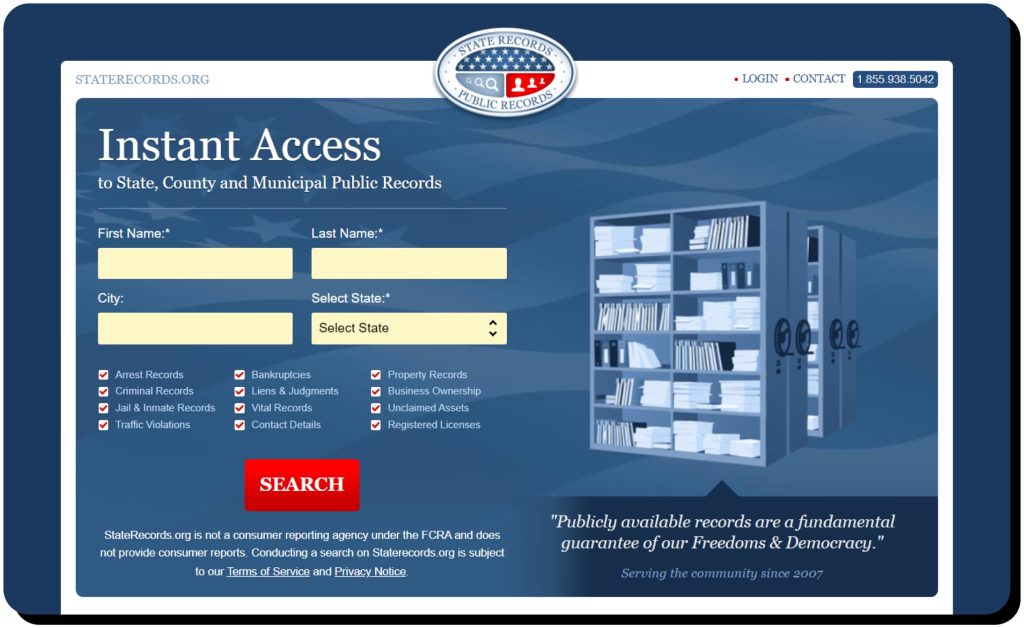
Why remove court records from the Internet?
On one hand, having open access to public records ensures the free flow of information. On the other, it puts your privacy at risk. And the repercussions can be very serious if you don’t take action to delete court records.
For starters, one can find public court records on various platforms – not solely via government agencies. Take data brokers and people-search websites that aggregate information from public records and combine it into “background reports.” These reports are easily accessible to anyone willing to look you up, often for free.
This leads to a high potential for impact both on your offline and online reputation. People you date, loans you qualify for, and jobs you apply for can all find this data. Even when there is no crime committed, seeing your name connected to a criminal or civil court case can lead to those people second-guessing their association with you.
Online court records also hold personally identifiable information (PII) like your legal name, home address, contact data, and other sensitive details. Criminals use this information to steal your identity, open up lines of credit and bank accounts in your name, and wreak havoc on your finances.
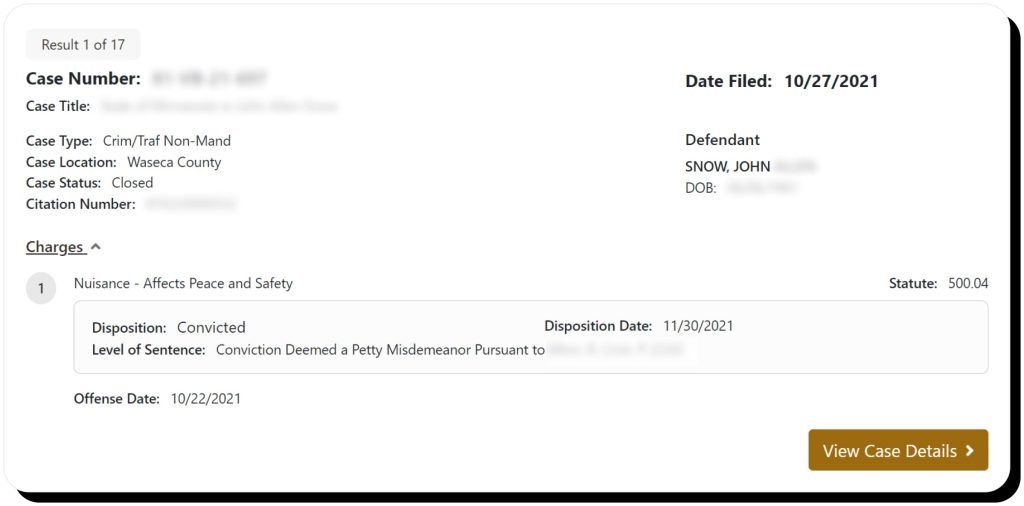
So, if you want to maintain your private information and Internet reputation, our next steps are for you.
Start with public records
If you want to have court records removed from the Internet, it’s best to start by removing them from the public record. To do this, you’ll need to petition the court where you were convicted to expunge, seal, or vacate these documents. It’s advisable to consult with an attorney for the best legal approach for your unique situation. Below, you’ll learn how each process differs.
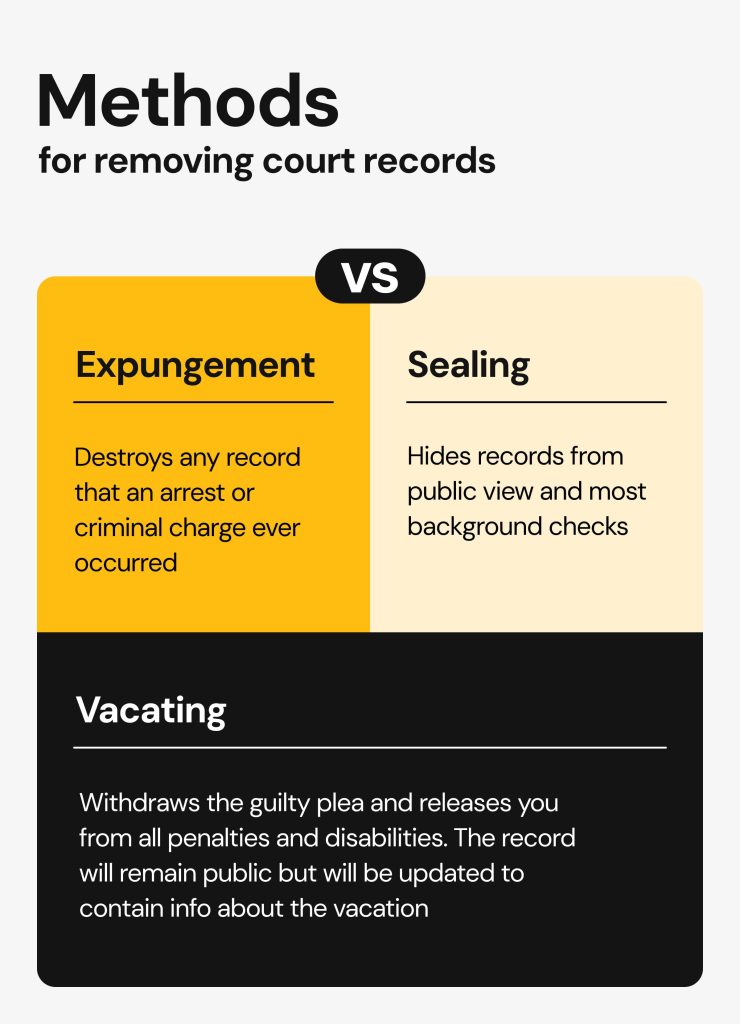
1. Expungement
Expungement is a court-ordered removal of records from public court documents. It is the ideal solution when hiding records from a court case. However, civil court cases are more likely to be removed than criminal ones. Also, expungement has specific eligibility requirements worth noting.
Here are several factors that are taken into consideration in court during expungement:
- The severity of the crime (felonies or misdemeanors)
- Whether there is a public need for the information
- How long ago the court record was created
- Whether you were a juvenile at the time of the court case
- Criminal history before and after the case
- Completion of probation, parole, or prison sentences
Juveniles typically receive the most leniency for expungement. For example, DUIs in Colorado can generally be expunged immediately after turning 21.
While the process varies on a state-by-state basis, a person seeking expungement must make a petition in the same court where the prosecution took place. If you want to expunge multiple court cases, you’ll need to file multiple petitions. The judge then determines whether to approve the expungement based on the requirements of the court jurisdiction.
2. Sealing court records
When court records cannot be removed, you might still be able to seal them. Sealing acknowledges that the court records still exist, but information from those records is not available to the public. This is often done to further the security of the affected party.
To meet the eligibility requirements for sealing records from a court case, there needs to be an overriding reason. This reason needs to be more compelling than the public’s right to access this information.
Situations where legal documents are sealed include juvenile records, settled civil cases, information about jurors, bail reports, presentence reports, and court expenditure records. In these cases, data within these reports could expose information about minors, reveal private or sensitive details, or expose data on a lawyer’s defense strategy.
If you want your records to be sealed, they typically need to meet one of these requirements:
- Protection for cooperating witnesses
- Information that creates a risk of identity theft or other criminal injuries
- Commercial information that might scandalize or defame someone in the commercial sector (generally in bankruptcy proceedings)
- Proof that you’ll suffer from embarrassment, harassment, or undue financial hardship
- Contains sensitive materials that might impact trade secrets or national security information
When making a legal argument for sealing records, that “overriding reason” should fall into one of the above categories. For example, court cases can contain medical records revealing sensitive medical information.
3. Vacating a conviction
Vacating court records means that the case is removed from your at-fault public record after the conviction. This differs from expungement which removes court case data regardless of whether you’re at fault or not. Vacating a conviction will label you as not at fault but might not remove court records fully.
State or federal law can differ greatly here, as some vacated records lead to them being automatically sealed. California, for example, has a record relief law that vacates and seals victims of human trafficking when convicted of a non-violent offense.
Meanwhile, in states like Seattle, vacating a conviction might not automatically seal it. Here, people can still look up your information, finding a “V” next to your name to indicate a vacated conviction.
Regardless, there is still value to vacating a conviction, as it corrects your criminal record. To vacate the record, you’ll need to provide evidence of no wrongdoing. So, this circumstance wouldn’t apply to a court document in a civil case, only a criminal one.
Vacating differs from dismissal in that it happens after a conviction takes place. Dismissal happens as a trial takes place. While the two yield similar results, they both happen at different times. After vacating, you’ll increase your odds of expunging or sealing records created during the initial court case.
How to remove court records online
After your public court records are expunged or sealed, you need to take extra steps to remove them from the Internet. Online sources, like data brokers and search engines, will not automatically respond to court decisions. So, it’s up to you to continue fighting to adjust the search results. There are four steps you can take that we will review below.
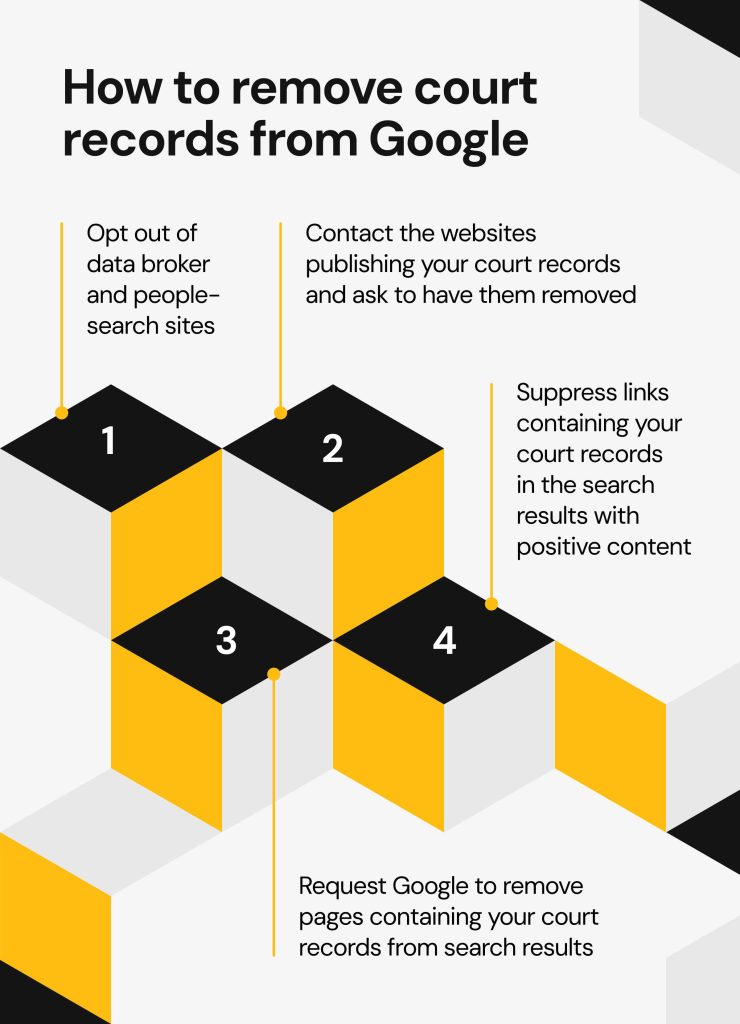
Step 1: Opt out of data broker and people-search sites
Data brokers and people-search sites contribute vastly to your digital footprint by collecting personal information via various sources, organizing this information into profiles, and publishing them online. One doesn’t even have to visit specific data brokers to find data about you – Googling you will be enough. That is because Google tends to prioritize links that provide as much information on a query as possible, and people-search sites do exactly that for your name.
What’s more, people-search sites don’t verify the data they collect from public records which often results in incorrect profile details, including false legal charges. In addition, even minor violations like speeding are listed as having criminal records. Not many people will dig deeper to see what “crime” exactly you have committed – seeing the words “criminal records” is enough to stop their interactions with you.
Luckily, data brokers are obliged to let you opt out if you request so. However, there are hundreds of them and each has its own removal procedures and requirements.
Onerep helps remove your court records and other private information by automating the opt-out process. Our service scans 230 data broker and people-search sites for your profiles and does all the opt-out work for you. After that, we keep monitoring each site in case your data is republished – then we remove it again.
Step 2: Contact the websites publishing your court records
Contact public records databases and other sites that don’t have opt-out procedures directly and ask to have all relevant data removed. You can choose to submit a query through the site’s contact form or see if the public domain has some email or phone-based contact methods. However, you should be careful to avoid threatening a lawsuit and leave that to legal professionals.
It’s worth noting that these sites are under no obligation to erase information impacting your online presence. In fact, without a valid court order, they are more likely to ignore your removal request, keeping inaccurate court case documents you’ve had sealed or expunged. This is when you can rely on an attorney to send a letter on your behalf, making it legally inadvisable for these companies to ignore your requests.
By bookmarking the offending page and checking it for updates, you’ll be able to determine whether the site has followed your request. But if it doesn’t, there are still two more options.
Step 3: Contact Google
It’s important to understand that the web pages in Google search results don’t belong to Google. Like other search engines, Google simply crawls the sites and displays the links that could satisfy a search query. However, if a website doesn’t agree to erase your court records, you can still contact Google and ask to have such pages removed from its search results.
One option is to reach out via the “Report Content On Google” troubleshooting. When using this form, Google responds to region-specific state or federal laws. This form usually only applies when there are privacy or intellectual property laws, such as using something you hold the copyright over in a way you don’t approve of.
You can also request to remove online content that hosts your personally identifiable information (PII). This might include government ID numbers, images of identifying documents, private sensitive information, and even personal contact data. Because online court records don’t often fall under this jurisdiction, this form isn’t applicable if you want to remove what might be considered data for the public interest. Having a court order will increase the chances that Google will remove this data from its search results.
After you make the request, you can monitor results by Googling your name. If your court order has a time frame, notify your attorney if these search results are still available after the given date.
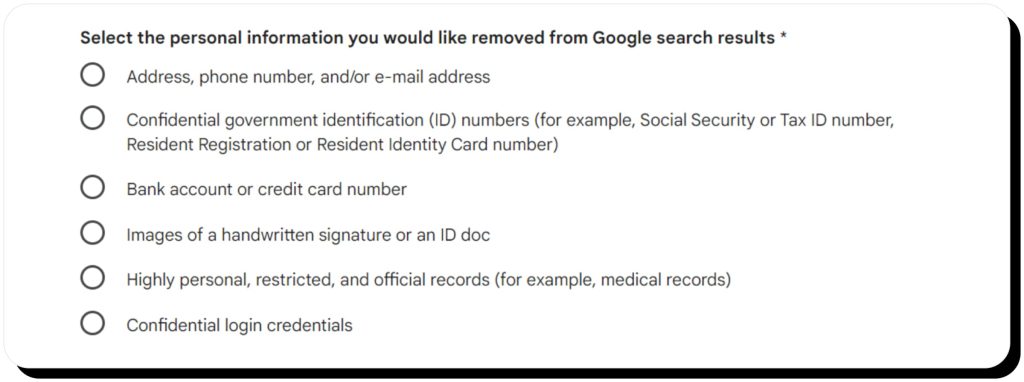
Step 4: Search engine suppression
In the event that you can’t remove them from Google search results, you can take steps to suppress court records from the top positions. This means creating business profile pages, websites, social media profiles, and articles – various positive content that will appear among top Google search results instead of your court history. The trick is to push negative content to page two or three, where very few users visit.
The challenge with online reputation management is that you might need to learn new skills (like search engine optimization) or outsource to a reputation management company. In either case, Google is fickle with who it decides to rank, and there’s no guarantee you’ll see immediate results. Still, if you lack a court order to force the removal of public records, this can be a decent alternative.
Tips for increasing the chances of success
Despite the steps for removal being relatively straightforward, it is no easy feat to actually remove public court records. Here are some tips you can keep in mind to increase your odds of success:
- Seal parts of the court document: Sealing all of the data from court documents is much more challenging than part of them. If you can, focus on the parts of open public records you’re most concerned about.
- Gather all necessary documentation: Each state and federal court requires different documents. Educate yourself on the local documentation requirements and have them in order.
- Be persistent: A court might not agree with your first argument. This is why you should come back with more compelling evidence. Sometimes, you’ll be assigned a different judge, so don’t give up after one try.
- Consider hiring an attorney: Making legal arguments without experience is challenging. This is why it’s advisable to hire an attorney or at least get a free consultation. Experienced professionals can provide you with the necessary information about the legal system that can make or break your case.
When looking for how to get arrest records off the Internet or have your court history removed, these tips can help increase your chances for success. However long it takes, don’t stop the fight to protect your personal information and public reputation.
Conclusion
Public court records, which are created anytime you enter a courtroom, can be a huge breach of privacy. Within them contains data about where you live, what your background is, and associations that might ruin both your offline and online reputation.
On the court level, you can remove them either through expungement or sealing. You can also start by vacating the record if you’ve been found guilty but have new evidence for your innocence. You should also take care of your digital presence and take steps to remove court records from the Internet to prevent any random person from easily accessing them. Finally, you can create positive content associated with your name online to move negative content down in online searches.
FAQs
How to remove court case from public record?
You can legally remove your court case from public records by expunging or sealing it. The first option erases the records totally, while the second simply hides them from public view. Both of these will require a petition to a judge where your case took place.
How long does it take to remove court records from Google?
Google can take weeks to remove public court records from its search engine results. This is because Google doesn’t update its data daily, as it often requires the site owners to send these updates.
What is the difference between expungement and sealing records?
Expungement removes the record completely. Sealing is acknowledging that the record exists but hiding it from public access.
Can background checks still find expunged court cases?
Expunged court cases cannot be found through any background checks. However, a sealed court record could be revealed if you’re applying for a federal job.
Can all types of court records be removed from the Internet?
You can remove online court records of all types from web search results as long as you have a good reason for it. This is determined by a judge in the jurisdiction where your court case took place and by site owners that publish this information.





Mark comes from a strong background in the identity theft protection and consumer credit world, having spent 4 years at Experian, including working on FreeCreditReport and ProtectMyID. He is frequently featured on various media outlets, including MarketWatch, Yahoo News, WTVC, CBS News, and others.